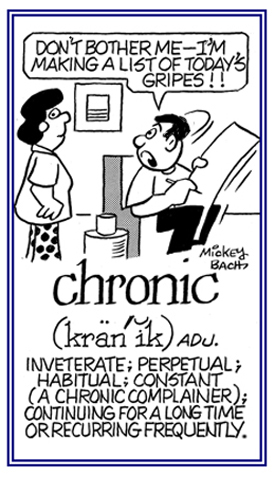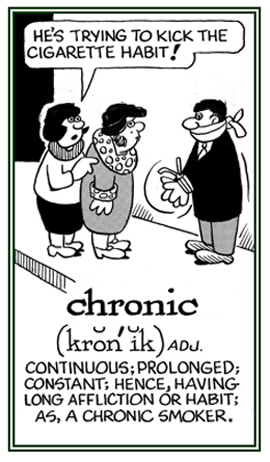chrono-, chron-
(Greek: time, times; sequence of times)
A relatively short-lived fossil flora or fauna: Representative fossil organisms or taxa that distinguish that time are called biochrons.
In geology, the study of the age of the Earth based on the relative dating of rocks and geologic events by the use of fossil evidence: Biochronology relates to the use of chemical analysis to estimate the age of biological events using biostratigraphic or paleontological methods.
The study of the deleterious effects of time on a living system: Mrs. Rush was doing research in catachronobiology to find out the harmful consequences of time on living organisms.
The shortest interval into which geologic time is subdivided: A chron is the interval of time determined by a certain stratum of rock chosen to represent all the rocks created throughout the same period of time
To keep better time is not to know time better. Time’s mystery is not lessened by ever better clocks—it is brought only more clearly into focus.
chronal (adjective), more chronal, most chronal
Of or relating to time: James thought he'd create a chronal chart for Sam so that he'd know how long the different stretches or driving would take.
The minimum duration of an electric current required to induce muscular contraction at a voltage of two times the threshold voltage: A chronaxie is a measurement of excitability of nervous or muscular tissue, or the shortest duration of an effective electrical stimulus having a strength equal to twice the minimum strength required for excitation.
A chronaxia is the time interval needed to stimulate a nerve or muscle fiber electrically.
A chronaxia is the time interval needed to stimulate a nerve or muscle fiber electrically.
An instrument for measuring chronaxie: Dr. Smart used a chronaximeter to calculate the time it took for the electric current to stimulate the nerve cells in the experiment.
chronaximetric (adjective) (not comparable)
Referring to chronaximetry: Jack wondered what the chronaximetric results were of the stimulation of the electric current on his leg muscle.
The measurement of chronaxie: Dr. Martin used the method of chronaximetry to determine the minimum time required for the electric current to stimulate Jack's leg muscle.
chronic (adjective), more chronic, most chronic
1. A reference to diseases, etc. that lasts a long time: Rheumatism is usually a chronic ailment.
2. Descriptive of expressions of disapproval involving severe and objectionable behavior: Mike's friend was a chronic liar to such a degree that even when he told the truth no one believed him.

© ALL rights are reserved.

© ALL rights are reserved.
Go to this Word A Day Revisited Index
2. Descriptive of expressions of disapproval involving severe and objectionable behavior: Mike's friend was a chronic liar to such a degree that even when he told the truth no one believed him.


Go to this Word A Day Revisited Index
so you can see more of Mickey Bach's cartoons.
An ailments that continues for a long time: A chronic illness usually lasts three months or more.
In ancient Greece, Hippocrates, the "father of medicine" distinguished diseases that were acute, that is abrupt, sharp, and brief; from those that were chronic.
chronical (adjective), more chronical, most chronical
An obsolete term of, or pertaining to time; regulated by time; chronic: James seemingly was affected with a chronical eye ailment.
The state of being chronic: Chronicity can reoccur in patients if the symptoms have not fully been resolved with proper treatment.
A written record, register, narrative, account; a frequent title of newspapers: A chronicle is a detailed and continuous register of events in order of time, or a historical record, especially one in which the facts are narrated without philosophic treatment, or any attempt at literary style.
chronicle (verb), chronicles, chronicled, chronicling
To record in an extended account of historical occurrences or events: Dr. Gray wanted to chronicle the incidents and episodes in his life as a doctor in the rural area where he had set up his office.
Related "time" units: aevum, evum; archaeo-, archeo-; Calendars; horo-; pre-; Quotes: Time; tempo-.


